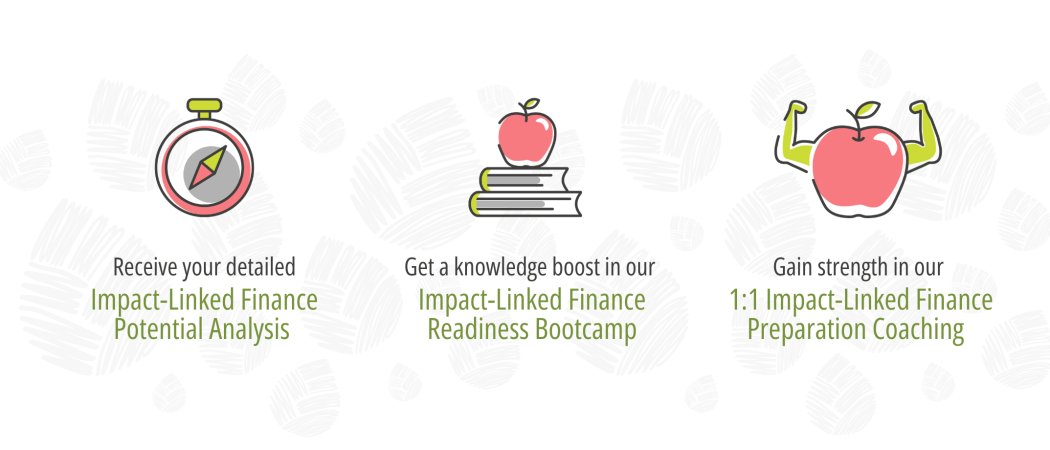Who Is The “Ready for ILF” Program For?
Who is the "Ready for Impact-Linked Finance" program for?
October 10, 2025
Who can benefit from the "Ready for Impact-Linked Finance" program
Would you like to know who can benefit from this first-of-its-kind program for impact enterprises based in Germany? In this blogpost, we will fill in you in on the most important takeaways and criteria.
What is the goal of the program?
With this program, we make impact enterprises based in Germany ready for Impact-Linked Finance – an innovative financing approach with integrated impact incentives. Through practice-driven bootcamps and coaching, we strengthen their impact measurement & management and increase their chances to receive better (financing) terms for better impact. But the program is also beneficial for impact investors and ecosystem supporters such as incubators, accelerators, philanthropic and public funders and advisors.
What's in it for you?
For impact enterprises:

- Learn how to build a reliable IMM system — the essential foundation for unlocking Impact-Linked Finance opportunities.
- Use your impact data to track progress, improve your impact, and show your readiness for Impact-Linked Finance.
- Improve your chances of receiving funding that directly rewards the impact you create.
- Lead investor conversations with confidence — negotiate financing terms that directly reward the impact you create.
For impact investors:

- Equip your startups with IMM tools and knowledge to measure, manage, improve, and report impact effectively.
- Access a pipeline of impact enterprises with credible and robust IMM systems, ready for Impact-Linked Finance, including term sheets
- Use transparent and standardized impact data to reduce investment risk and increase impact confidence.
- Get support in exploring and potentially piloting Impact-Linked Finance structures with expert partners (subject to separate engagement)
For ecosystem supporters:

- Equip your startups with IMM tools and knowledge to measure, manage, improve, and report impact effectively.
- Strengthen the social innovation ecosystem by aligning startups and investors with proven ways to measure and reward impact.
- Leverage expert support to use and scale Impact-Linked Finance readiness across your portfolio and networks.

Who qualifies for this program?
Companies serving the common good:
There are the following requirements for supported companies and start-ups set for the program (all need to be met). The requirements are set by the Federal Ministry for Economic Affairs and Climate Action, which funds this program under the “Nachhaltig Wirken” umbrella.:
- Companies serving the common good as defined by the European Commission’s “Social Business Initiative”: These are companies for which the social or ecological, public-benefit-oriented goal represents the meaning and purpose of their business activities, which is often expressed in a high degree of social innovation.
- The social, ecological, or public-benefit-oriented goal must be demonstrably evident in the business documents (e.g., objective in the founding document, presentation within the framework of the company mission, etc.).
- Profits have to be largely reinvested (in this funding context, understood as at least 50 percent) to achieve this goal.
- The organizational structure or ownership has to reflect this goal and is based on the principles of co-determination or employee participation or oriented towards social justice.
In addition, the following criteria must be met:
- Small and medium-sized enterprises (SMEs): companies with up to 250 employees, a turnover of up to €50 million, and a balance sheet total of up to €43 million.
- A company is defined as any entity that engages in economic activity, regardless of its legal form and the type of financing it uses. Economic activity is defined as the offering of goods and services on a market.
- The SME status must be demonstrated in the form of a self-declaration at the beginning of the program “Ready for ILF”.

Who do we target for the program's specific offerings?
The Impact-Linked Finance Potential Analysis

The Potential Analysis is aimed at all public-benefit companies in Germany that want to leverage the potential of Impact-Linked Finance and need an assessment of their status. These companies are very interested in integrating their impact directly into their financing. However, they may lack an understanding of what this means in concrete terms, how they can prepare for it, and what requirements they should meet. The recommended actions will help them close any gaps and successfully apply for the Bootcamp or (depending on their status) directly for the 1:1 Coaching.
The Impact-Linked Finance Readiness Bootcamp

The Bootcamp is aimed at public-benefit companies with potential for ILF, which still need to improve their Impact Measurement & Management (IMM) system. This includes companies that have made initial considerations about their impact system – for example, have already developed a Theory of Change (ToC) – but are not yet able to comprehensively measure their impact. Typical challenges include identifying relevant data, defining key impact areas, and identifying target groups with the greatest potential for impact. The bootcamp teaches the necessary foundations that enable enterprises to meet the basic requirements for ILF. Even at this stage, we place particular emphasis on key ILF criteria, such as the materiality of impact, a focus on outcomes rather than outputs, and the integration of climate protection/adaptation indicators.
The 1:1 Impact-Linked Finance Preparation Coaching

The 1:1 Coaching is aimed at enterprises that already have an advanced IMM system and meet the essential requirements for Impact-Linked Finance (ILF). Such enterprises can become “ILF-ready” within a relatively short time, including the ability to demonstrate their impact (with previously collected data) and a robust financial model, and the wish to seek growth capital.

